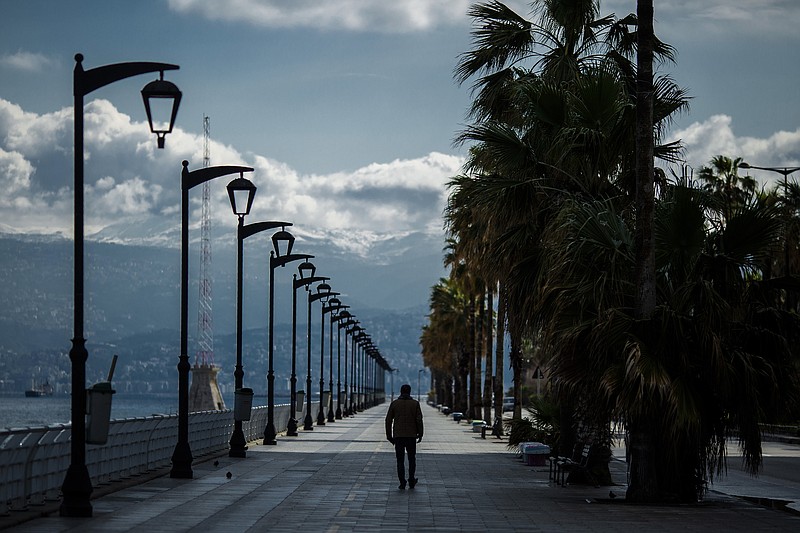.
AMMAN, Jordan (AP) - Air raid sirens echoed across Jordan's capital Saturday to mark the start of a three-day curfew, the latest mass lockdown in the Middle East aimed at containing the coronavirus, which has claimed another 123 lives in Iran, home to the region's worst outbreak.
The latest deaths bring Iran's overall toll to 1,556 amid 20,610 confirmed cases, according to figures released by the Health Ministry. Iran has faced widespread criticism for its lagging response to the outbreak, which has even infected and killed some senior officials.
In one of the strictest measures yet, Jordan has ordered all shops to close and all people to stay off the streets until at least Tuesday, when it plans to announce specific times for shopping. Authorities have already arrested 392 people accused of violating the curfew, said Amer Sartawi, a spokesman for the Public Security Directorate. He warned anyone violating the orders would face legal action.
Several countries in the Middle East have closed schools, universities and nonessential businesses. Many are threatening fines or jail time to those caught violating the decrees.
Egypt announced all museums and archaeological sites, including the famed pyramids at Giza, would be closed from Monday until the end of March. Mostafa Waziri, head of the Supreme Council of Antiquities, said authorities would sterilize all sites during the closure.
Egypt also announced the temporary suspension of Friday prayers and other congregations in all mosques. The Coptic Orthodox Church canceled all services and wedding parties and said funeral processions would be limited to family members of the deceased.
Egypt reported 294 cases and 10 deaths, and there are increasing calls for a curfew. The most populous Arab nation is home to more than 100 million people. Cairo, the capital, is one of the most densely populated cities on earth, with more than 20 million residents.
Iran has been much slower to take action against the virus. It has urged people not to travel during the Persian New Year, a major national holiday, but many appear to be ignoring the guidance. Health Ministry spokesman Kianoush Jahanpour said the number of cases has increased in many popular tourist destinations.
Iran has not ordered businesses to close, though many have done so on their own. Authorities only began closing popular religious pilgrimage sites earlier this week, long after the first virus cases were detected. There are concerns the country's health care infrastructure, weakened by severe U.S. sanctions, could be overwhelmed.
Most people only experience minor flu-like symptoms from the coronavirus and recover within a few weeks, but the virus is highly contagious and can be spread by those who appear well. It can cause severe illness, including pneumonia, in some patients, particularly the elderly and those with underlying health problems.
More than 275,000 people have been infected worldwide. The virus has killed more than 11,000 people, while more than 88,000 have recovered.
Israel reported another 178 infections, bringing its total to 883, the second highest number in the region behind Iran. But that appears to be the result of stepped-up testing. Israel's Health Ministry has only reported one fatality and said only 15 patients are seriously ill. The ministry said it has tested more than 17,000 people.
Saturday was Mother's Day in the Middle East, and many took to social media to lament the fact they would not be able to visit family members. Others thanked mothers who spent the holiday working as doctors or nurses at hospitals. One popular online greeting card praised mothers as the original advocates of hand-washing.
In Iraq, Lt. Gen. Othman al-Ghanimi, the army chief of staff, ordered a 50 percent reduction in on-duty personnel. Officers already on leave were instructed not to return until March 31, and women were granted extended leave.
Iraq, which has reported 193 cases and 14 deaths from the coronavirus, is still battling remnants of the Islamic State group.

